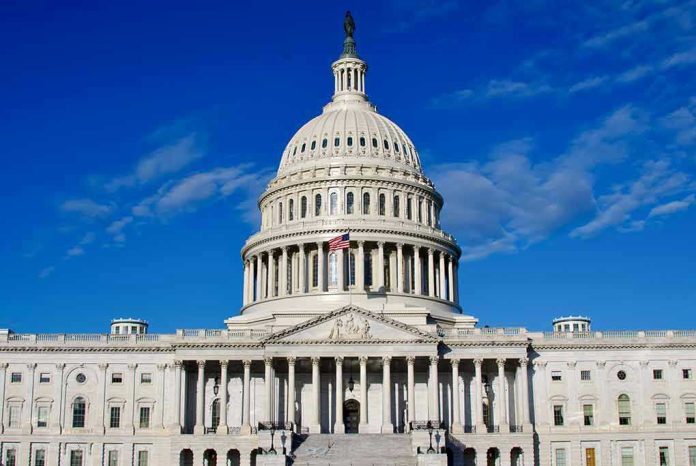
“Terminate the filibuster or watch America fall—President Trump’s rallying cry is more than political theater; it’s a battle line in the fight for the country’s survival.”
Story Snapshot
- President Trump demands Republicans eliminate the Senate filibuster to counter Democrats.
- He frames the filibuster as a weakness threatening America’s future.
- The debate spotlights broader concerns over gridlock and the power struggle in Congress.
- Conservative voices weigh the risks and rewards of scrapping the procedural safeguard.
Trump’s Challenge: End the Filibuster or Lose the Nation
President Trump once again turned the spotlight on the Senate filibuster, branding it as the weak link in the Republican chain. His message is as unvarnished as ever: eliminate the filibuster now, or risk handing the country over to what he calls “deranged” Democrats. By choosing language that frames this as a matter of national survival, Trump escalates a long-running procedural debate into a front-page existential crisis for the conservative movement.
The filibuster, a Senate rule requiring a 60-vote supermajority to advance most legislation, has long been a double-edged sword. Conservatives have defended it as a bulwark against radical change, a means to force negotiation, and a check on fleeting partisan majorities. Trump’s critique flips this narrative on its head. He argues that clinging to the filibuster is no longer a show of principle, but of weakness—one that “deranged” Democrats have already exploited and will continue to use to block conservative reforms and judicial appointments.
The Filibuster: A Symbol of Principle or a Tool for Obstruction?
Within Republican ranks, the filibuster’s reputation is complicated. Traditionalists see it as essential to protecting minority rights in the Senate, a last line of defense against hasty legislation. Yet Trump’s call taps into a growing frustration among conservative voters and lawmakers who view the filibuster as little more than a shield for Democratic obstructionism. The contemporary Senate has seen the filibuster wielded less as a rare safeguard and more as a routine blockade, fueling calls to terminate it in the name of “saving the USA.”
Many conservative policy priorities—from border security to election reform—have died on the Senate floor, casualties of the 60-vote threshold. Trump’s rhetoric resonates with those who argue that today’s political climate demands decisive action, not endless compromise. His warning against being “weak and stupid” is calculated to shame any Republican who hesitates, casting the filibuster as a relic that serves only the opposition’s interests.
The Stakes: Gridlock, Power, and the Future of American Government
For critics, scrapping the filibuster risks unleashing a tidal wave of unchecked legislative power. They warn that what can be used to advance conservative priorities today could just as easily fuel a progressive agenda tomorrow. History offers examples: the so-called “nuclear option” has already eroded the filibuster for judicial nominations, and each escalation brings new calls for total abolition. Still, Trump and his allies insist that the greater threat lies in legislative paralysis—gridlock that leaves America vulnerable to what they view as the radical ambitions of the left.
Conservative values of common sense and strong leadership loom large in this debate. Trump’s framing is clear: it’s time for Republicans to stop playing defense and start using every tool at their disposal. His demand to “terminate” the filibuster is not just about passing bills; it’s about projecting strength and ensuring the survival of his vision for America. Whether this call to arms gains traction—or sets off a new round of intraparty conflict—remains an open question, with enormous consequences for the country’s political future.
Sources:
Trump’s ‘nuclear’ demand not landing for Senate Republicans amid shutdown













